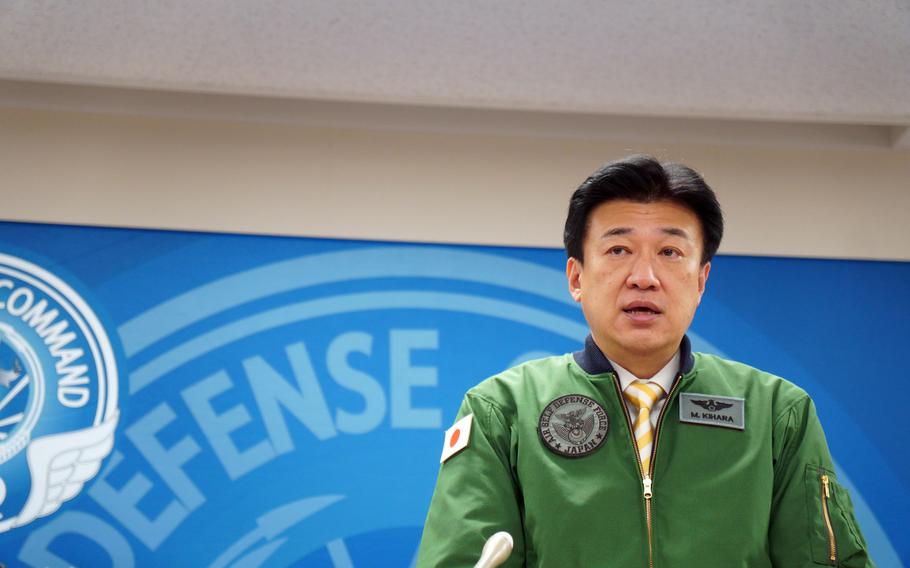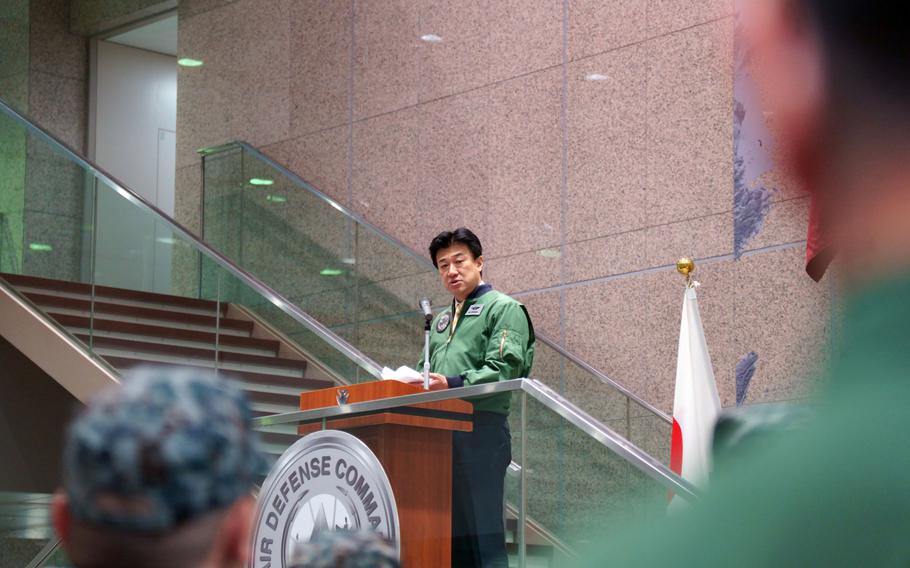
Japan's newly appointed defense minister, Minoru Kihara, visits Air Defense Command at Yokota Air Base in western Tokyo, Tuesday, Oct. 10, 2023. (Akifumi Ishikawa/Stars and Stripes)
YOKOTA AIR BASE, Japan — The Japan Air Self-Defense Force is adding to its name as potential threats from space become “more diverse, complex and advanced,” the nation’s defense minister said Tuesday at this airlift hub in western Tokyo.
The change to Air and Space Self-Defense Force is scheduled for fiscal year 2027, according to a document posted on the Defense Ministry website.
Clad in a green bomber jacket, newly appointed Defense Minister Minoru Kihara told around 100 Japanese airmen at Air Defense Command headquarters at Yokota that the threats they face have become more complicated amid advances in aircraft and missile technology.
“Today, it is extremely important for our country to respond to threats from the air,” he told reporters at the headquarters. “With the advent of ballistic missiles, cruise missiles, manned and unmanned aircraft and hypersonic missiles, the threats to our country from the air are becoming more diverse, complex and advanced.”
Japan’s air force frequently scrambles its fighters to meet Chinese and Russian aircraft approaching Japanese air space; it also tracks North Korean missile tests over the Sea of Japan, also known as the East Sea, including high-arching ballistic missiles that enter space.
Kihara recently returned from Washington, where he met with Defense Secretary Lloyd Austin on Oct. 4 and discussed Japan’s plans to accelerate the acquisition of hundreds of Tomahawk missiles.

Japan's newly appointed defense minister, Minoru Kihara, speaks at Air Defense Command headquarters at Yokota Air Base, Japan, Tuesday, Oct. 10, 2023. (Akifumi Ishikawa/Stars and Stripes)
Japan approved a $51.4 billion defense budget this fiscal year, which started in April, and plans to buy 400 Tomahawks from the United States to develop counterstrike capabilities between fiscal years 2025 and 2027.
At Yokota, the headquarters of U.S. Forces Japan, Kihara saw Japanese and American airmen working closely together, he told reporters.
To deal with threats from the air, the defense force needs to improve information gathering, communication and use of space, Kihara said.
“Taking these points into account, the name (of Japan’s air force) will be changed to Air and Space Self-Defense Force,” he said.
The Air Self-Defense Force established a Space Operations Group last year at Fuchu Air Base, about five miles southeast of Yokota.
The U.S. Space Force is expanding its presence in Japan and may establish a headquarters at Yokota, Gen. Chance Saltzman, chief of space operations, told reporters in Tokyo on Sept. 25.
Securing the use of space is a vital issue for national defense, Kihara said Tuesday.
“We will build satellite constellations with the aim of acquiring target detection and tracking capabilities, conduct technology demonstrations aimed at improving our ability to deal with detection and tracking of hypersonic glide weapons and strengthen our space domain awareness capabilities to understand the movements of debris and untrustworthy satellites while strengthening cooperation with the United States,” he said.